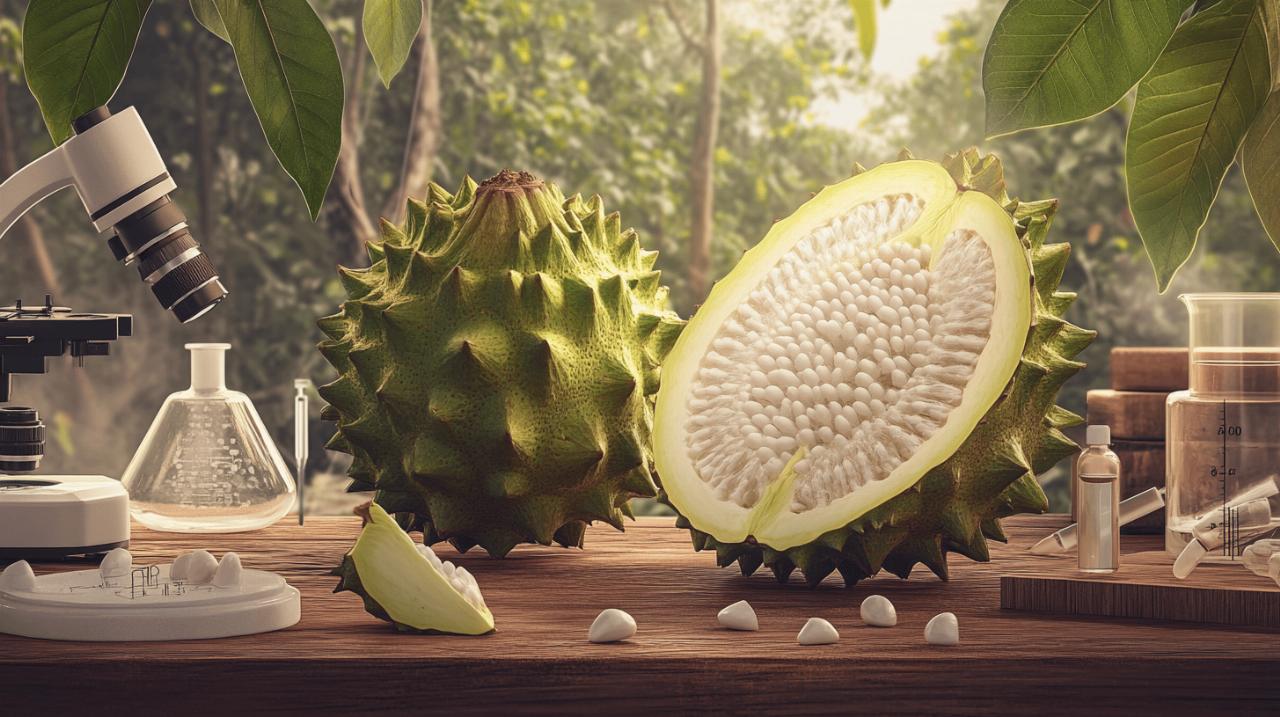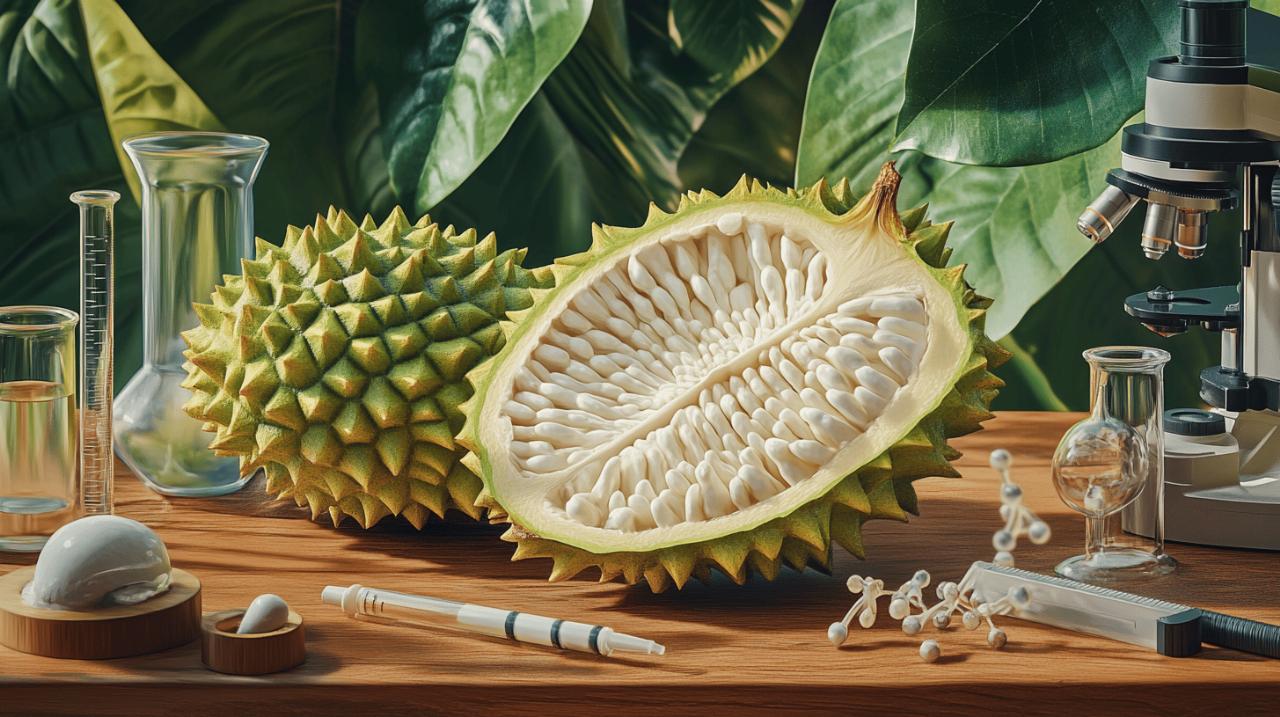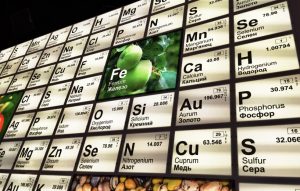Custard apple, also known as soursop or cherimoya, has gained significant attention in recent years as a potential cancer treatment. With its sweet, creamy flesh and impressive nutritional profile, this tropical fruit has found its way into discussions about alternative cancer therapies across the United Kingdom. But what's the real story behind these claims? Let's dive into the science, examine patient experiences, and separate fact from fiction.
Understanding custard apple and its purported benefits
What is Soursop (Custard Apple) and Its Nutritional Profile
Custard apple (Annona squamosa), also called soursop, sugar apple, or graviola, is a tropical fruit with a distinctive sweet and tangy flavour. Nutritionally, it's quite impressive – one cup of raw custard apple provides approximately 148 calories, 7.42 grams of dietary fibre, 2.25 grams of protein, and a wealth of essential vitamins and minerals. The fruit is particularly rich in potassium, magnesium, vitamin C, and various antioxidants that contribute to overall health.
Research examining different parts of the custard apple has revealed impressive nutritional composition. The pulp contains between 81-83% moisture, while the peels of certain cultivars contain up to 3.30% protein. Perhaps most notably, custard apple is a substantial source of minerals, with some varieties containing significant amounts of calcium (84.33 mg/kg) and iron (20.72 mg/kg) in the pulp.
The Rise of Custard Apple in Alternative Cancer Discussions
In recent years, custard apple has emerged as a topic of interest in alternative cancer treatment circles. This phenomenon has been fuelled by laboratory studies suggesting potential anticancer properties, particularly from compounds called acetogenins found in the fruit. Traditional medicine systems have long used various parts of the plant to treat ailments including fevers, digestive problems, and infections, lending a historical backdrop to modern interest.
Social media has amplified these claims, with numerous posts asserting that soursop can cure cancer outright. Such bold statements have resonated with many cancer patients seeking additional options beyond conventional treatments, particularly those facing difficult prognoses or challenging side effects from traditional therapies.
Scientific evidence and research limitations
Laboratory studies vs human clinical trials
The scientific interest in custard apple's potential anticancer properties is legitimate but must be viewed with proper context. Laboratory studies have demonstrated several promising mechanisms through which compounds in custard apple might combat cancer. Research indicates that extracts from various parts of the plant, particularly the seeds, show anticancer activity against several cancer cell lines, including colon, prostate, liver, and breast cancer cells.
These extracts appear to work through multiple mechanisms, including causing apoptosis (programmed cell death), blocking metastasis (cancer spread), disrupting cell signalling pathways, and interfering with ATP production in cancer cells. One study found that seed extracts had particularly low IC50 values (indicating higher potency) against prostate and breast cancer cell lines at 7.31 µg/ml and 15.99 µg/ml, respectively.
Despite these promising laboratory findings, there remains a critical gap in the research: human clinical trials. Scientists have been studying graviola for approximately 50 years, yet virtually all evidence comes from test tubes or animal studies. This distinction is crucial because many compounds that show promise in laboratory settings fail to demonstrate the same effects in the human body due to differences in metabolism, bioavailability, and complex biological systems.
What uk medical institutions say about soursop claims
British medical institutions maintain a cautious stance regarding custard apple as a cancer treatment. Cancer Research UK acknowledges that compounds in soursop could potentially help prevent cancer initiation, but emphasizes that more human trials are essential before any definitive claims can be made. The organization warns against relying on unproven remedies that might delay seeking conventional medical care.
The UK's National Health Service consistently advocates for evidence-based approaches to cancer treatment and prevention. They emphasize that while a diet rich in various fruits and vegetables contributes to overall health and may reduce cancer risk, no single food item should be viewed as a cure. This position aligns with global health authorities, including the World Health Organization, which recommends consuming at least five portions or 400g of fruits and vegetables daily as part of a balanced diet.
Risks and Considerations for Cancer Patients
Potential interactions with conventional cancer treatments
Cancer patients considering custard apple supplements or excessive consumption should be aware of potential risks. Some research suggests that compounds in soursop might interfere with certain cancer medications or affect their metabolism in the body. This interference could potentially reduce the effectiveness of conventional treatments or increase their side effects, though more research is needed to fully understand these interactions.
There are also concerns about direct side effects from concentrated custard apple supplements. Studies have linked regular consumption of graviola to neurological issues similar to Parkinson's disease, possibly due to the same acetogenins that demonstrate anticancer properties. Additional reported risks include low blood pressure and reduced blood sugar levels, which could be problematic for patients on certain medications.
False hope and delayed medical care concerns
Perhaps the most significant risk associated with custard apple cancer claims is their potential to create false hope, possibly leading patients to delay or forego proven medical treatments. Medical professionals express concern when patients become overly focused on alternative remedies based on preliminary evidence, particularly when these remedies are marketed as miracle cures.
This concern is well-founded given the historical pattern of misleading cancer cure claims. The US Food and Drug Administration has previously issued warnings to companies marketing soursop products with unsubstantiated cancer treatment claims. Moreover, one troubling study actually linked soursop consumption to lower survival rates among breast cancer patients, highlighting the complex reality behind seemingly straightforward claims.
Balanced Approach to Cancer Prevention and Treatment
Evidence-based cancer prevention strategies
 While the specific role of custard apple in cancer prevention remains uncertain, there is strong evidence supporting broader dietary and lifestyle approaches. Research suggests that healthy dietary patterns could potentially lower cancer incidence by 30-40%. The WHO and other health organizations recommend consuming at least five portions of fruits and vegetables daily, with studies indicating that 550-600g per day may reduce cancer incidence by approximately 14%.
While the specific role of custard apple in cancer prevention remains uncertain, there is strong evidence supporting broader dietary and lifestyle approaches. Research suggests that healthy dietary patterns could potentially lower cancer incidence by 30-40%. The WHO and other health organizations recommend consuming at least five portions of fruits and vegetables daily, with studies indicating that 550-600g per day may reduce cancer incidence by approximately 14%.
Beyond diet, established cancer prevention strategies include maintaining regular physical activity, avoiding tobacco products, limiting alcohol consumption, maintaining a healthy weight, and following recommended cancer screening guidelines. These evidence-based approaches have demonstrated benefits across multiple studies and populations, making them reliable foundations for cancer prevention efforts.
Incorporating Custard Apple as Part of a Healthy Diet, Not a Cure
Rather than viewing custard apple as a miracle cure, a more reasonable approach is to consider it as one component of a varied, nutritious diet. The fruit offers genuine nutritional benefits through its vitamin, mineral, fibre, and antioxidant content. These nutrients support overall health and may contribute to the body's natural defenses against various diseases, including cancer.
For those who enjoy the taste of custard apple, incorporating it into a diet rich in diverse fruits and vegetables is perfectly reasonable. The fruit can be enjoyed fresh, in smoothies, or as part of various dishes. However, it's important to maintain realistic expectations about its health effects and to continue following medical advice regarding cancer prevention and treatment. Consulting healthcare professionals before making significant dietary changes remains the wisest approach, particularly for those with existing health conditions or those undergoing medical treatments.
Uk patient testimonials: stories and experiences
Custard apple, also known as soursop, graviola, or Annona squamosa, has gained significant attention among British cancer patients seeking alternative treatments. This tropical fruit, rich in nutrients including vitamins, potassium, and fibre, has become the subject of many personal accounts from individuals across the UK who have incorporated it into their complementary care routines.
Analysing anecdotal evidence from british cancer patients
Across the UK, numerous cancer patients have shared stories about including custard apple in their diet. Many report feeling generally better after regular consumption, attributing increased energy levels and improved sense of wellbeing to the fruit's nutritional profile. The fruit's high antioxidant content, particularly its phenolic compounds and flavonoids, may contribute to these subjective improvements. Laboratory research has identified that Annona cultivars contain significant levels of these beneficial compounds, with studies showing the highest phenolic content in seed extracts (284 μg GAE/g) and flavonoid content (122.71 μg QE/g).
Some British patients have reported more dramatic claims, suggesting tumour shrinkage or cancer remission following custard apple consumption. While laboratory studies have indeed demonstrated that custard apple extracts can induce apoptosis (cell death) in various cancer cell lines including breast (MCF-7), prostate (PC3), liver (HepG-2), and colon (Caco-2) cancer cells, these findings remain confined to petri dishes and animal models. The promising anticancer activity observed in labs hasn't yet been validated through proper human clinical trials, making such testimonials scientifically unsubstantiated.
Separating Fact from Fiction in Personal Accounts
When examining patient testimonials about custard apple's cancer-fighting properties, it's vital to distinguish between scientific evidence and personal experience. The phytochemical properties of custard apple, particularly acetogenins, have shown impressive results against cancer cells in laboratory settings. These natural compounds can disrupt ATP production in cancer cells and block cancer spread (metastasis) in test tubes and animal studies.
Despite these promising laboratory findings, we must acknowledge the lack of human clinical trials. No controlled studies have confirmed custard apple's efficacy as a cancer treatment in humans. In fact, one concerning study linked soursop consumption to lower survival rates in breast cancer patients, highlighting the complexity of translating laboratory success to real-world outcomes.
The gap between anecdotal success stories and scientific validation remains substantial. While patient testimonials provide valuable insights into lived experiences, they cannot substitute for rigorous clinical research. The World Health Organisation recommends at least 5 portions of fruit and vegetables daily for overall health, and custard apple can certainly be part of a nutritious diet that supports wellbeing during cancer treatment.
Patients considering custard apple should maintain realistic expectations. Rather than viewing it as a standalone treatment, it's more appropriate to consider it as one component of a comprehensive approach to health that includes conventional medical care. British patients should discuss any dietary supplements with their healthcare team, particularly given concerns about potential nerve damage and interactions with medications.



 In a fun and accessible way, we will introduce you to different themes related to health, physics and chemistry. Increasing your knowledge is our credo!
In a fun and accessible way, we will introduce you to different themes related to health, physics and chemistry. Increasing your knowledge is our credo!